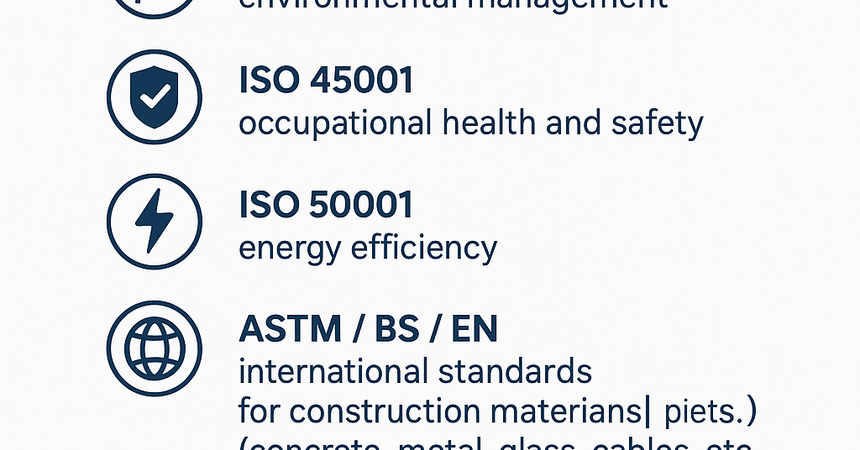NEOM is Saudi Arabia’s ultra-ambitious megaproject worth over $500 billion. It includes the construction of smart cities, tourist complexes, industrial zones, and green energy facilities. The main goal of the project is to create a territory of the future, where technology, sustainability, and human comfort are integrated into a single system.
In terms of scale, NEOM has no analogues: here, “The Line” — a linear city stretching 170 km — is being built, along with the Oxagon industrial complex, the Trojena desert ski resort, and multiple infrastructure facilities. To realize these plans, millions of tons of construction materials, innovative technologies, and equipment from all over the world are required.
But only suppliers capable of proving the quality and safety of their products through certification gain access to this construction of the century.
Why Certification Plays a Key Role
1. Highest quality standards
Given the project’s global scope, multiple systems of norms apply simultaneously: European (EN, CE), American (ASTM), British (BS), and local (SASO).
2. Ecology and sustainability
NEOM is envisioned as a zero-carbon city. This means that construction materials and equipment must meet environmental requirements: energy efficiency, low emissions, and recyclability.
3. Climatic conditions
Materials must withstand Saudi Arabia’s hot climate, sandstorms, and sharp temperature fluctuations. Certificates of resistance to extreme conditions are therefore mandatory.
4. Safety and innovation
The project involves new types of concrete, steel, composites, as well as intelligent building management systems. All of these require specialized testing and certification.
Mandatory Certificates for NEOM Suppliers
- ISO 9001 – quality management system.
- ISO 14001 – environmental management.
- ISO 45001 – occupational health and safety.
- ISO 50001 – energy efficiency.
- ASTM / BS / EN – international standards for construction materials (concrete, metal, glass, cables, etc.).
- LEED and BREEAM – green certification confirming material and building sustainability.
- SASO (Saudi Standards, Metrology and Quality Organization) – Saudi national standards, mandatory for market access.
- Fire safety and extreme condition certificates – required for all materials and structures.
Certification Stages for Suppliers
- Preliminary audit – review of company documentation and existing certificates.
- Assessment of compliance with international and national standards.
- Product testing – laboratory tests for strength, safety, and sustainability.
- Obtaining ISO / ASTM / CE / SASO certificates.
- Registration on NEOM’s electronic tender platforms.
- Periodic inspections and monitoring – especially for key product categories.
Risks for Businesses Without Certification
- Loss of access to the world’s largest construction project.
- Rejection from tenders despite competitive pricing.
- Additional costs for urgent document revisions and retesting.
- Reputational risks — being perceived as an unreliable partner.
Opportunities for Certified Suppliers
• Participation in NEOM’s multi-billion-dollar tenders.• Long-term contracts with global contractors.
• Entry into the Saudi and Gulf markets.
• Enhanced global credibility — certifications recognized in NEOM open doors to other megaprojects.
Practical Example
For example, concrete suppliers must hold a SASO Quality Mark and comply with ASTM standards. Glass manufacturers must confirm not only mechanical strength and light transmittance but also resistance to sandstorms. Cable producers must pass fire safety and energy efficiency tests under ISO and SASO standards.Conclusion
The NEOM project sets new rules for the construction industry. Only companies ready to confirm the quality of their products and undergo full certification under both international and Saudi standards will be able to become part of this city of the future.Contact WorldWideBridge – we provide turnkey certification services and secure access for your products to the world’s largest construction project.
